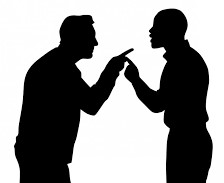No nation looks to our deliberative branch as a model for building consensus.
Congress is the best example of the price we can pay when the rewards of public performance are greater than those of private negotiation. Donald Trump and the so-called “Freedom Caucus” have tried out rhetorical in-your-face antics reminiscent of some of our darkest comics, but without the fun or wit.

No one looking for a model of governmental efficiency would take any comfort from a good look at the current House leadership debacle. Its twin failures to produce effective public policy and work with the President offer cautionary truths about how to fail to produce effective action. The House of Representatives is a broken institution with public approval ratings to match. No country looks to our deliberative branch as a model for building consensus. Bipartisanship occasionally breaks out and offers momentary hope. But it has become a major achievement to keep the government funded for a whole month. In the process, the Speaker of the House who finally negotiated a compromise promptly lost his job. In this body, the few conciliators in the governing party that remain seem mute and mostly ineffective. For their part, Democrats appear to be willing to let the chaos continue, hoping it will convert into electoral gains. As an idea, E pluribus unum no longer has much appeal.
While this branch of the of government was not designed to work with the efficiency of a parliament, congressional dysfunction now leaves so much on the table that leaves Americans less well-off and secure: everything from immigration reform to timely allocations of funds for infrastructure improvements. We know this institution is in deep trouble when many of its members are now willing to risk triggering a government default and imperiling the dollar’s status as the world’s reserve currency: usually for no more than pressing some dubious ideological point.
What is wrong? What best practices for communicating in organizations are routinely ignored? Briefly, some of the overwhelming problems on Capitol Hill have their origins in two ineffective communication patterns.

The first is that the body is obviously and hopelessly organized into factions—notably parties, special interest caucuses, and their media—making it likely that members will only work to defend their kind rather than the whole. Since most of the process of legislating is done away from the floors of the House and Senate, it falls to party leaders, whips, and members to work out in private and with their own caucuses what they will accept by way of a legislative agenda. Differences of opinion have fewer chances to be moderated in environments that would encourage conciliation. The founders feared this hyper partisanship for good reason. Indeed, Senate and House Leaders now move so cautiously in their narrow partisan lanes that it can be hard to tell if their images on a screen are stills photos or videos.

This problem is compounded by a tradition of individual offices set up as separate fiefdoms spread over four buildings on the east side of the Capitol. One wonders how different legislative life would be if the 435 voting members of the House worked in the conditions known to most of white-collar America: in the same ‘cubicle farm’ spread over one or two floors. As it is, support staffs and dispersed offices enable the kind of isolation of members that discourages more discussion across party lines. Revealingly, members note that most no longer share a meal in the U.S. Capitol’s various dining rooms: a small but revealing change from the past.
A second problem is the changing character of those seeking high public office. In the age of social media and 24-hour news there seems to be more interest in the expressive possibilities of serving in public office than doing the work of governing. The temptation to continually raise campaign funds can easily become all-consuming.
In the lore of Congress there has always been an expectation that the “show horses” would sometimes win out over the “work horses.” A retired Lyndon Johnson once complained to a CBS producer about the “pretty boys” created by the growth of television. The former Senate Majority leader’s point was that visual media gave rise to a new breed of members more interested in the theater of politics than finding ways to bridge differences. We are electing figures who have very little interest or skill in active deliberation.
Since it is a solid axiom that we more easily find comity in small groups, trying to forge leadership within large bodies like the 535 member Congress needs to be seen for the problem it frequently is: the organizational equivalent of trying to get even a few dozen college professors to form a single straight line. We seem to no longer find much joy in political unity.
![]()

